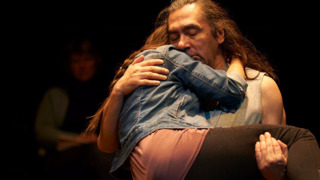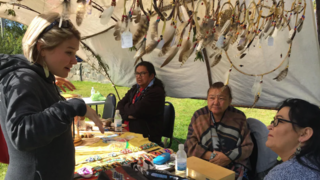Cultural Appropriation
The arts milieu regularly erupts into controversies over issues of cultural appropriation. This is usually followed by a stale debate in which cultural appropriation is understood, both by popular media coverage and within artistic communities. We wish to establish a framework that moves beyond the reductionist polarization of ‘censorship versus ownership’.
One hears - mostly from white, straight male artists, ‘Do not censor my imagination. I am an artist; I have artistic freedom. I have a right to depict any person from any race or culture that I choose and I do not need anyone’s permission to do this.’ This is countered - usually by IBPoC artists, queer artists and feminists - ‘I am an artist as well, my stories and images have been invisible in the art world for decades, for centuries. I speak from my experiences, my culture, my race. Some of my people’s artistic traditions can be sacred, not simply for the taking. The cultures of the world are not an arts smorgasbord.’
The protests against cultural appropriation from IBPoC artists respond to the careless use of their images, stories, traditions by the mainstream art world. There are many tributaries that flow into these conversations - colonialism; power relations; racism; fragility of artistic practice; cultural ownership; tradition; elders’ knowledge and many that flow out - Indigenous artistic self-determination and sovereignty; censorship; copyright; new protocols and methodologies; IBPoC artists’ rights; cultural hybridity.
We assert that moving beyond the reductionist polarization of ‘censorship versus ownership’, we must recognize two facts: first that, across history and across cultures, art practices merge, combine, hybridize and, yes, appropriate, from one another…this is the very nature of the evolution of culture and therefore, art forms. Second that power relations exist in the world! They colour everything including what is considered as art; who is celebrated for making it and how to reach new arts audiences.
We are not trying to ‘censor’ anyone. We are well aware of the dangers of silencing artists. However, we insist on developing ways of understanding concepts like artistic freedom in more complex ways that include methodologies like respect, responsibilities and reciprocity. We emphasize that ‘artistic freedom’ is a term that emerges form Western philosophical thought about the nature of being human in the context of society. It is but one way of understanding this relationship.
The issues that surround cultural appropriation are knotty, complicated and urgent. We see that not only new understandings are needed, but also that new protocols and arts methodologies are developing. We encourage discussions on what works well; what works sometimes; and what to avoid. We want to amplify current attempts to collaborate artistically and anticipate problems; find constructive ways to deal with those problems so that artworks can reach completion with all creative partners feeling respected.

Sharing Insights
Duncan McCue, James Cullingham, Jani Lauzon
What does narrative sovereignty look like in practice and in creative fields where Indigenous professionals have been...

Sharing Insights
Simon Brault et Steven Loft
The Canada Council for the Arts (CCA) takes a public stand against the appropriation of Indigenous cultures with new ...

Sharing Insights
Think Before You Appropriate is a practical guide for creators and designers to develop responsible and respectful re...
Displaying all 3 projects